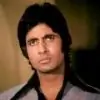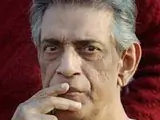Satyajit Roy on Music
Extract from - Revisiting Satyajit Ray An Interview with a Cinema Master
From 1961 onwards, starting with
Teen Kanya , you have composed the music for your own films. Before concluding, could you address the subject of music in general and film music in particular?
Yes, of course. Music has been my first love for many, many years — perhaps from the time I was thirteen or fourteen. As a child, I had a toy gramophone and there were always plenty of records in our home. Then later, at Presidency College and while I was at the University of Shantiniketan, I became seriously interested in Western classical music. I did not have very much money in those days, so obviously it was a question of collecting slowly, one movement of a symphony or a concerto at a time.
When I started working, I began to take music even more seriously. I not only began to collect records, but I also got into the habit of buying musical scores. I remember there was a shop in Bombay in those days — S. Rose and Company — which used to sell miniature or pocketbook German scores. These became bedside reading for me. During the day I would listen to the records with the scores in hand, and then when I read the scores again at night, the music would all come back to me. This is also when I started to become familiar with staff notation.
Why primarily the interest in Western classical music?
You see, our home has always had a tradition of listening to Rabindrasangeet and Indian classical music. My uncle was a great music lover, and the promising new musicians in those days would come regularly to our place and perform. So, since I was familiar with Indian music — from these private performances and from going to public concerts — I did not feel that there was anything more I needed to do in order to learn about it.
With Western music, on the other hand, I experienced the excitement of discovering something new, completely uncharted territory: Beethoven and others whom I had only read about, doing something that did not exist in our music. I shared this enthusiasm with several friends, and I remember that the salesmen at Bevan & Co., in Dalhousie Square, used to be quite astonished that three or four young Bengalis could be so interested in Western classical music.
In 1966 you said, "Of all the stages of filmmaking, I find it is the orchestration of the music that requires my greatest attention. At the moment, it is still a painstaking process."
Well, you know, I get involved in the composing of music only once a year or so. If I were a professional composer, perhaps I would have a greater facility for this work. You also have to remember that I was completely self-taught in the area of music. I would jot down musical ideas for a film in shorthand form, so scoring became quite a trial. Now, with experience, the whole process has become somewhat easier for me. Even so, I can't put a musical idea on paper as quickly or as smoothly as a professional composer can. And this work, for me, is very time-consuming and tension-inducing. The tension is sometimes increased when the musicians don't play as I want them to, because they are used to playing very differently — especially here in Bengal.

Did this sense of not being too sure of yourself musically, early on, have anything to do with the fact that, in
Pather Panchali (
right), Ravi Shankar was one of the few professionals you used?
I thought of using Ravi Shankar not primarily because he was a close personal acquaintance with whom I would feel comfortable working. I thought it would be a good idea to work with someone like him, who would be able to introduce a fresh approach — quite unlike conventional Bengali film composers at the time.
How was it to work with a famous musician like Ravi Shankar?
Even at that time, Shankar was quite busy with his foreign tours. I had written to him in Bombay — or was it Delhi? — that I was thinking of making Pather Panchali and would like him to do the music. Then I went to see him when he came to Calcutta. He sort of hummed for me a melodic line — a folk tune of sorts — and I thought it was just right for Pather Panchali. So that became the film's musical theme — entirely Shankar's contribution.
Despite your interest in Western classical music, then, you have an aversion to using it in your films.
Oh, yes, that's right. A lot of films have used Western classical music, and not always with success. You know that Bo Widerberg's Elvira Madigan uses, again and again, parts of Mozart's Concerto 453 in G Major. Later on, I found the LP called "The Elvira Madigan Concerto." That's terrible! Scandalous, even. Because, you see, then you are assuming that the film will rise to the level of the music; but what often happens is that the music is brought down to the level of the film! Particularly in this case, the two don't mix — like water and oil. Yes, I know that Stanley Kubrick used the Ninth Symphony played on a synthesizer in A Clockwork Orange; and I suppose it works for this film, though I wouldn't want to possess a record of it. And Kubrick has done some other daring musical things that just come off — like his use of "The Blue Danube" in 2001: A Space Odyssey. I myself wouldn't mind using a relatively unknown piece of Baroque music — something by Couperin or Scarlatti, for instance — in a film if I can find the right subject.
I hate films, by the way, that are drenched with over-romantic music of the kind you find in some of those lush Hollywood films from the early 1940s. You got someone expensive for your music director, like Max Steiner or Alfred Newman, so you let him drown the film in music. You see, most of the American directors — with the exception of four or five, like William Wyler, Billy Wilder, Frank Capra, and George Stevens — had no control over a film after they finished shooting it. I asked John Huston, whose films are so wonderful, about his Treasure of the Sierra Madre, which is absolutely ruined by its music. And he said he had no control over the score; perhaps also, he's not musical, as some directors aren't, and the producers took advantage of this fact.
So I gather that you feel background music is really an extraneous element in films — that one should be able to express oneself without it.
My belief is that, yes, a film should be able to dispense with music. But half the time we are using music because we are not confident that certain changes of mood will be understood by the audience — so we underline these changes with mood music. I would like to do without music if such a thing were possible, but I don't think I'll ever be able to do it. I will say that I have used very little music in my contemporary films and as much natural sound as possible.
 Initially, I did feel that film needed music partly because long stretches of silence tend to bore the audience: It's as simple as that. With music, the scene becomes "shorter" automatically. And in certain types of films, music is a must unless you have a very rich natural soundtrack. Then there's the type of film where music is needed just to hide the rough edges. You know, De Sica's earlier pictures — Bicycle Thieves, Miracle in Milan, Shoeshine, Umberto D. — were very grainy films, shot at a time when they were using five different kinds of black-and-white stock, and when shooting conditions were terrible, right after the Second World War. Not that the cutting or camera movement is bad — De Sica's a master in those departments — but some "rough" scenes simply cried out for music, and he had a marvelous composer, Cicognini, who provided it.
Initially, I did feel that film needed music partly because long stretches of silence tend to bore the audience: It's as simple as that. With music, the scene becomes "shorter" automatically. And in certain types of films, music is a must unless you have a very rich natural soundtrack. Then there's the type of film where music is needed just to hide the rough edges. You know, De Sica's earlier pictures — Bicycle Thieves, Miracle in Milan, Shoeshine, Umberto D. — were very grainy films, shot at a time when they were using five different kinds of black-and-white stock, and when shooting conditions were terrible, right after the Second World War. Not that the cutting or camera movement is bad — De Sica's a master in those departments — but some "rough" scenes simply cried out for music, and he had a marvelous composer, Cicognini, who provided it.
In general, let's just say that whether you are going to use music or sound effects depends on the mood of a scene. If a specific sound effect is crucial, I don't even think of using music in its place. And when you are trying to control time, to maintain real or chronological time, I would say the less music there is, the better, though sound effects can help a lot in this instance. When time is broken up, by contrast, music helps to preserve a linear flow.










 Did this sense of not being too sure of yourself musically, early on, have anything to do with the fact that, in Pather Panchali (right), Ravi Shankar was one of the few professionals you used?
Did this sense of not being too sure of yourself musically, early on, have anything to do with the fact that, in Pather Panchali (right), Ravi Shankar was one of the few professionals you used?  Initially, I did feel that film needed music partly because long stretches of silence tend to bore the audience: It's as simple as that. With music, the scene becomes "shorter" automatically. And in certain types of films, music is a must unless you have a very rich natural soundtrack. Then there's the type of film where music is needed just to hide the rough edges. You know, De Sica's earlier pictures — Bicycle Thieves, Miracle in Milan, Shoeshine, Umberto D. — were very grainy films, shot at a time when they were using five different kinds of black-and-white stock, and when shooting conditions were terrible, right after the Second World War. Not that the cutting or camera movement is bad — De Sica's a master in those departments — but some "rough" scenes simply cried out for music, and he had a marvelous composer, Cicognini, who provided it.
Initially, I did feel that film needed music partly because long stretches of silence tend to bore the audience: It's as simple as that. With music, the scene becomes "shorter" automatically. And in certain types of films, music is a must unless you have a very rich natural soundtrack. Then there's the type of film where music is needed just to hide the rough edges. You know, De Sica's earlier pictures — Bicycle Thieves, Miracle in Milan, Shoeshine, Umberto D. — were very grainy films, shot at a time when they were using five different kinds of black-and-white stock, and when shooting conditions were terrible, right after the Second World War. Not that the cutting or camera movement is bad — De Sica's a master in those departments — but some "rough" scenes simply cried out for music, and he had a marvelous composer, Cicognini, who provided it. 
















